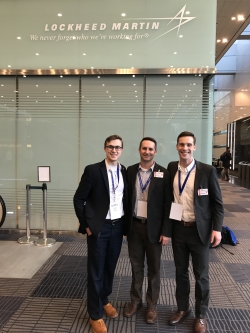UAVs, Engineering, and Ethics
PROVO, Utah – Jun 27, 2019 – Undergraduates typically don’t have to worry about fulfilling a contract with the Department of Defense (DOD) managing a drone company’s mistakes. But that’s exactly what BYU Marriott students Scott Williams and Griffin Holt spent a weekend in Maryland doing.
Williams, a senior accountancy major from Bothell, Washington, and Holt, a junior computer science major from Salt Lake City, took first place at the Lockheed Martin Ethics Engineering competition held at the company’s headquarters in Maryland. Earlier this year, the team was given a hypothetical ethical dilemma and had four weeks to consult with mentors and professionals to create a solution that would stand up to the judges’ questioning and scrutiny.
The team was assigned to consult for a hypothetical company that would be unable to fulfill its contract with the United States Department of Defense. The contract called for the company to produce fifty unmanned aerial vehicles (UAVs or drones) for the department. However, only forty-five of the UAVs would be operational when the department was scheduled to see a demonstration of the drones. The company was faced with either using unethical solutions to quickly fix the unoperational drones or default on its contract, which would cause financial harm to the small town in which the company was based.
By consulting with BYU Marriott professor of ethics and leadership Brad Agle, former BYU Marriott adjunct faculty member Justin Ames, and DOD personnel, Williams and Holt presented a solution that put them on top of the other teams. “Williams and Holt demonstrated a strong holistic understanding of the business problem and the ethical elements embedded in it,” says Ames. “Rather than presenting one ethical choice, they were creative and innovative in presenting multiple solutions from varying stakeholder perspectives. In a few cases, they found potential solutions that the professional judges had not even considered.”
Creating a solution they could be proud of was always important to Williams and Holt. “We wanted our solution to be what was most ethical instead of seeing how close we could skirt to the bounds of legality,” said Williams. Team members also credit their success to one of them being an engineering student and another being a business student, bringing together two disciplines that often do not have the chance to collaborate with each other in the undergraduate world.
The BYU Marriott team went up against thirteen other schools, including West Point Academy. The team’s skilled presentation of its ethical analysis was the result of long weeks and hours of hard work and practice. “While being interrupted and constantly challenged on nearly every point, Williams and Holt were professional and polished, and they demonstrated a deep level understanding of their proposed solutions,” says Ames. “This allowed them to respond with courage and fortitude when the judges increased the pressure.”
The competition was fierce, but this didn’t stop Williams and Holt from making some friends along the way. “Even though we were competing, we became friends with many people from other schools,” says Williams. “Connecting with other people from different backgrounds with a shared interest in ethics was great. By the end, Griffin and I became so close with other teams that we even had a few people rooting for us.”
Participating in ethics competitions can boost the understanding of business ethics students need before they head out into the professional world. “If there’s anything BYU Marriott wants to be known for, it’s the ethics and integrity of its graduates,” says Agle. “But it goes beyond that. We want our students to be leaders who influence others for good. And that’s exactly what Williams and Holt have demonstrated in Maryland.”
Media Contact: Chad Little (801) 422-1512
Writer: Ellen Ford




